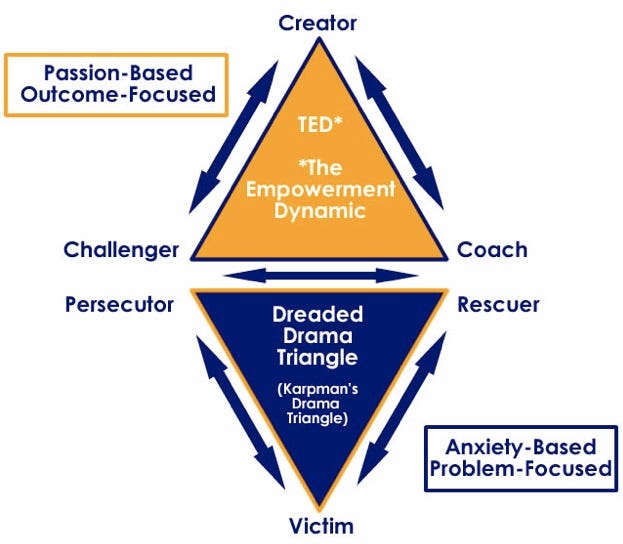Equity and the Practical Empowerment of Literacy
The Transformational Power of Practical Interventions in Education
NOTE: This image, used with a Creative Commons license, depicts two triangles representing two distinct approaches to intervening in difficult or challenging circumstances. The bottom triangle is based on the Karpman Drama Triangle, which sets up a co-dependent cycle of Victim, Persecutor and Rescuer. The top triangle is based on The Empowerment Dynamic (TED), which sets up an agency and empowerment cycle of coaching, challenging, and creating.
While I’m working on Part two of “Carrying a Message Forward”, which is a reflection on Erec Smith’s book, Critique of Antiracism in Rhetoric and Composition, I wanted to pause to share a quick anecdote with readers about the power of practical interventions in the lives of students of color.
This writing was originally a comment on a social media post in which a friend and I were debating the benefits of what I am now calling “pop” Critical Race Theory, the confessional sinfulness-oriented version of CRT that has become mainstream in many educational institutions.
A few years back, I taught a young Black woman how to read in a program I am a part of (I won't say, which program, to protect her identity). She was older than others in this program and had not been in a classroom for more than a decade.
Because of my specific training in reading recovery and "phonemic awareness" and syllabication with a reading recovery program (Lindamood-Bell), I was able to observe that the reason she was reluctant to read aloud in front of other students was because she simply could not sound out the words. Any words over two syllables (and many that were in only two syllables), she would substitute with another word that she clearly hoped would be the correct word.
The result for this young woman was that she seemed to be consistently embarrassed and rarely had opportunities during academic work to showcase her natural intelligence, competence, insightfulness, and brilliance. The only time that came out was during group discussions, where she shined with humor, grace, extraordinary insight, an egalitarian spirit and a genuine approach of curiosity, investigation and intellectual sophistication.
We had a good relationship, as I realized early on, not to call on her to read aloud, but always during discussions, wanting to respect her own sense of dignity and to empower what she was already powerful at.
Over a period of several months, she and I worked one on one in a public area of the community building, where I introduced her to systematic instruction in phonics, phonemic awareness (the actual parts of the mouth, teeth, lips and tongue that made consonants and vowel sounds), common endings and beginnings, consonant blends, and rules for breaking words into syllables (syllabication), and by the end of the semester, she was reading at a much higher level.
Much of this young woman's progress depended on her following through with the exercises I gave her to work on at her home. The main exercises I gave her involved breaking "nonsense words" into syllables so that she would no longer need to rely on humor, guessing, and word recognition, but instead would be able to use pattern recognition to learn how to break words down into smaller “chunks”.
This young Black woman not only passed the course, but went on to successfully complete the program. After mastering the art of decoding (breaking words down phonetically), she went on to master the content of other courses which greatly relied on her ability to read difficult texts.
I mention this not to be a "white knight" (another faux-progressive phrase I have come to strongly dislike) but to illustrate that it’s not always racism that holds people back. Or sexism or homophobia for that matter.
At this same program, I gave a presentation a while back to a certain committee. One of the committee members mentioned the achievement gap between Blacks and whites at the program and, looking at the data, insisted the outcomes were a result of racial bias. I shared this anecdote, and ask a question that I will now ask of the reader.
If I hadn't intervened with reading recovery strategies, and this young Black woman had not completed the program, can we be sure that it racial bias was the only cause? Could it not have been at least partly due to the structural disenfranchisement of not having been taught a specific, pragmatic practice?
I think the answer is somewhere in the middle.
We can and should account for the systemic racial bias that has been present in our systems since the founding of the country because this bias and the unfair systems it has given birth to has created the conditions in which specific difficulties are experienced by real people. But, while we need to continue working to create more just systems, we also need to see things clearly and look at what the possibilities are for solving problems in the here and now without resorting to one-size-fits all causes such as seeing all specific problems as directly caused by racism. The idealistic fervor behind the urge to blame racism for a difference in outcomes between different groups can often hamper our ability to find real world solutions that can actually solve a real problem.
Our ideals often get ahead of pragmatic approaches to transforming lives, and I'm not at all interested in ideologies that want to keep us away from participating in actual transformation.
Sometimes a practical intervention can be the most transformational of all.




